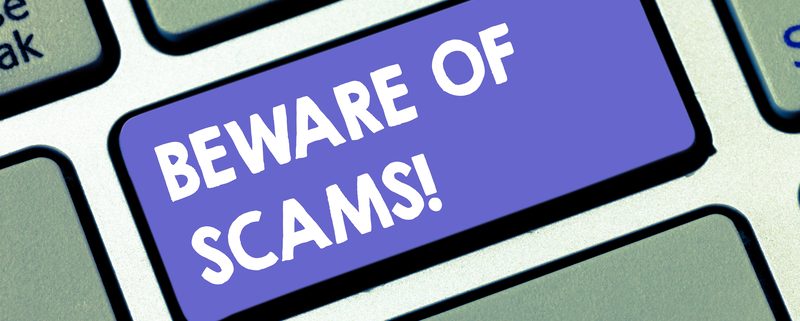Ten Signs of Self-Directed IRA – Related Investment Scams
The vast majority of people in the retirement industry are legitimate. Some are more skilled than others, of course. But most of them are out to do the right thing. Almost nobody is deliberately trying to fleece or deceive their clients or investors.
But as in any industry, there are a few bad apples. And so, it pays to be able to spot who they are.
Fortunately, there are a few common tells. If you spot any of these red flags, take your money and walk away.
1. Language that implies IRS approval or endorsement. Scammers try to pull the wool over people’s eyes by claiming that whatever scheme they are hawking has an IRS seal of approval. This is never the case.
The fact is the IRS does not involve itself with reviewing, approving or endorsing any particular security, investment or financial product for suitability for your Self-Directed IRA. They only prohibit a few types of investments – life insurance, collectibles such as art or antiques, alcoholic beverages, gems and jewelry and certain forms of precious metals of uncertain or insufficient purity. Beyond that, they do not endorse or approve anything for use in IRAs.
Anyone claiming they do is very likely trying to deceive you.
2. They are advertising on the radio or TV infomercial. Many investment scammers reach people via television and radio advertising. They cannot grow their scam via word of mouth from satisfied and successful clients, so they go after strangers via TV and radio.
This does not automatically mean the investment is bad. But you should never invest on the sole basis of having seen or heard an advertisement. In fact, if the product is being sold via infomercial, it’s a good idea to some extra due diligence.
3. Lying about custodial responsibilities. Some criminals imply that the IRA custodian or some other party guarantees their investment against investment losses. However, Self-Directed IRA custodians are generally not in the business of evaluating investments for other people – much less guaranteeing customers against investment loss. Some will carry insurance against physical loss. For example, if a custodian is holding physical gold and bullion for your IRA, they may carry insurance against theft or loss of the physical asset. But they will not provide guarantees against investment losses. Neither do third-party administrators such as American IRA, LLC.
Anyone who tells you they do is probably lying.
4. Unsolicited contact. Be cautious when dealing with anyone who contacts you unsolicited and pressures you to transfer assets from an existing IRA or other retirement account into their product in a Self-Directed IRA.
5. Promises of high returns with no risk. This is perhaps the number one fraud indicator. Stay away from promoters who promise above-market returns in a specific amount of time, guaranteed. Remember – there is no such thing as a free lunch. Investments that are reaching for above market returns must always involve some risk.
There are insured products, of course, such as annuities. But these typically will not have above-market returns. Insured products are risk-reduction vehicles, and not designed to outperform underlying benchmarks over the long haul.
6. Affinity schemes. Some of the biggest frauds in the Self-Directed IRA industry operated by abusing an affiliation relationship. For example, they try to take advantage of people’s trust by relying on church connections, veteran status or other affinity groups.
7. General partnerships. These are not illegal to own in an IRA. But general partnerships are very risky from a wealth protection perspective, since they provide no limited liability protection. A limited partnership, on the other hand, does provide some protection for the limited partners – your losses will be limited to your investment in the asset.
8. Requests to transfer IRA assets directly to a promoter. This is a major red flag. IRA assets should be held by a separate, independent third-party administrator, such as American IRA, LLC, or an approved custodian.
9. Past licensing problems. In investing, past performance is no guarantee of future results. But when it comes to investment promoters, a history of fraud convictions, fines, license suspensions or other disciplinary history is a pretty good indicator of future problems. It’s a good idea to look up the promoter on BrokerCheck before investing.
10. Requests to transfer all your money into a single security or product. In the U.S., brokers have a responsibility to ensure that investments they recommend are at least suitable. But advocating a client put their entire life savings into a single product subject to market or investment risk would not be suitable, by definition. Be very cautious about investment promoters wanting you to concentrate all your wealth in a single product.
More information on how to avoid IRA and other investment fraud is available from the SEC here.
Note: American IRA, LLC does not screen investments for suitability – nor do any custodians or third-party administrators of Self-Direct IRAs. We can provide general information, but we do not assess individual securities or products. That is not our function, and other than avoiding illegal investments, we do not second-guess clients or their advisors. Ultimately, the responsibility for due diligence is yours, along with your financial advisors.
Interested in learning more about Self-Directed IRAs? Contact American IRA, LLC at 866-7500-IRA (472) for a free consultation. Download our free guides or visit us online at www.AmericanIRA.com.









